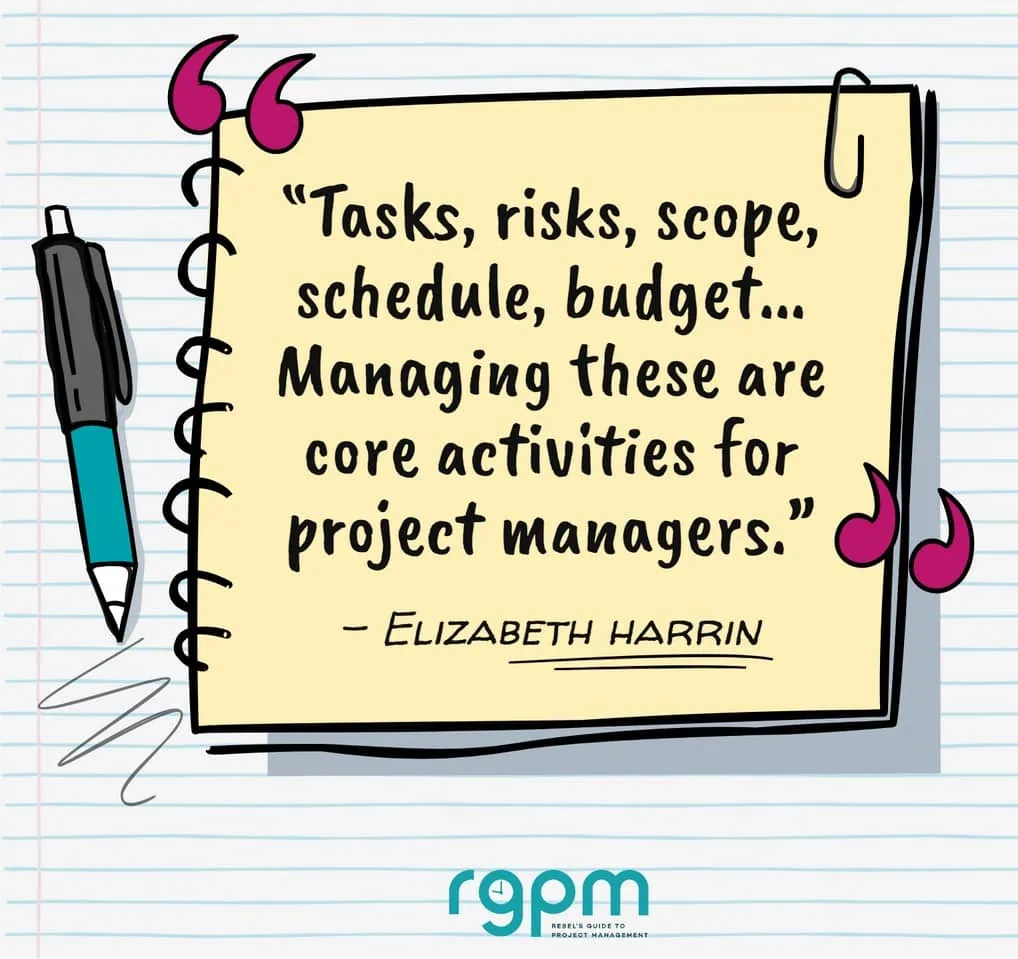How to Fix 5 Project Management Skills Gaps
I bet your project sponsor expects you to dive into the detail and understand why a line of code isn’t working, and strategically advise on business benefits as a result of your project… and everything in between.
As a project manager, you are expected to have all-round skills encompassing the technical fields of project management like planning and scheduling, through to the interpersonal skills like communicating up and influencing others.
When you look through the lists of competencies for a project manager, it’s hard not to be daunted by the huge range of skills that we are supposed to have. And I don’t have them all – I’m aware of that.
Unfortunately I’m not able to say, “I’m struggling with Excel right now, I really don’t have these budgeting skills, so we won’t bother to have a budget tracker on this project.”
If you don’t have the skill (or don’t enjoy a particular element of managing your project), you either need to learn or make sure the team includes someone who can pick up the slack.
Below are 5 of the areas where I know people struggle with skills, and a couple of tips about how you can improve in those areas.
These also work for coaching your team, so if you are definitely not interested in learning all those spreadsheet formulae, help someone else get their skills up to scratch so they can best support you!

Skill #1: Managing tasks
Task management involves making sure that the work that is delegated to any individual team member is appropriate and doesn’t overload them. It involves resource levelling and ensuring that you track time.
It also involves making sure that people know what their priorities should be. Even the best, most organized people on your team will need a steer as to what they should be focusing on – and probably a reminder about upcoming milestones.
Boost your skills: Timesheets will help you track time more effectively. They might not be a popular choice but once you have made the switch you’ll find the data incredibly useful.
Skill #2: Managing risks
Risk management is a core skill for a project manager, and one that I would hesitate to ‘outsource’ to a team member. So much of risk management is tied up in being able to see the big picture, and as a project manager you are best placed to do that.
However, risk management overall is a team sport: anyone can identify a risk and you should spread risk ownership amongst the team so your name isn’t down against everything.
Learn how to help your team manage risk so you can split the work between you.
Boost your skills: Make sure everyone on the team knows how to manage risks and what the process is. Everyone should have the confidence to bring new risks to the table.
Increase your own skills in this area by ensuring you know what your boundaries are – what kind of risk mitigation activities you can authorize and what needs to be run past someone else.
Skill #3: Managing scope
Understanding the
Of course, you can’t say no to everything either – the skill comes from being able to balance the competing needs of stakeholders and the sanity of your team, the budget, the schedule, and everything else.
If you don’t have the skills to deal with change you could end up delivering something that is not fit for purpose or never finishing the project at all.
Boost your skills: Start by understanding how to manage a change as laid out by your Project Management Office. It’s important to know what qualifies as a change and what triggers the change process – not every schedule change, for example, is going to need to go through an approval process (thankfully, or you’d be there all day).
Check that you know who needs to approve changes. For some, like technical changes – or business changes that have a knock on implication for technical changes – you might have several approval steps to get through before you can go ahead and update your project plans.
Skill #4: Scheduling
Scheduling takes task management to the next level. It’s juggling dependencies. It’s crashing. It’s ladder and hot air balloon scheduling to see everything on a page.
It’s knowing your project management software inside out and having it do most of the heavy lifting for you.
If you don’t have skills in scheduling, you are going to find it hard to get your project set up effectively and to track the work as you go through.
If you work in a company where there is someone who can take the scheduling work off you, then by all means use them. But don’t think this negates your own need to understand how your project schedule fits together.
As the project manager, you are ultimately responsible for the time frames, and you need to know your schedule thoroughly.
Boost your skills: First, get to know your project management software. Learn how it schedules, what the automated settings are and how to override them.
Next, make sure you understand the flow of work: what drives what and how tasks are linked. Your team knows all this stuff, so draw on their knowledge. Then schedule around people, not tasks.
Finally, make sure that when you are scheduling you are doing so with all the data – correct and accurate data. Again, lean on the team to put together estimates that are reliable: working with the correct numbers makes everything easier and helps you avoid common scheduling mistakes!
Skill #5: Managing the budget
A project budget might be the first time a new project manager has had responsibility for handling the company’s money, and I know that project expense management isn’t the easiest of things to get to grips with. Different companies have different approaches to this, so you might have no budget responsibility and yet be expected to deliver the project on target, or have to account for large amounts of money with virtually no finance training.
Budget management is definitely a skill to develop because it is useful in future roles too – say, if you move into a role with a P&L responsibility. In my view, this isn’t an area of the project to try to delegate to someone else unless you have a dedicated financial analyst seconded to your project team.
Boost your skills: Software can help here too, as long as you know how to use it. Take a crash course in spreadsheets if you don’t know your SUM from your COUNTIF.
Don’t be afraid to take shortcuts if your company has a budget template for your project (or it’s built into the software you use). As long as you understand and can explain the figures, you don’t have to crunch them yourself if you trust the reports from your PMO or tools.
Remember, your company likely has a whole team of people who do budgeting and financial management for a living, so if you are struggling, ask for help. Your project sponsor can connect you with someone in the Finance team who will be able to explain why project accounting should be done in the way that is mandated.
Your next steps
If you follow these simple suggestions, you’ll be able to plug the gaps in your project management skill set, or be able to coach and mentor a colleague through improving their own skills.
If you’d like someone to help you put together a plan to build your confidence in these skills (or any others), then get in touch with me to book a mentoring power hour – we can soon get you on the right path or skilled up in what you need to know!
Need a mentor?
Book a power hour with me. Gain some clarity about your career or get support for a project in a one on one session.
Pin for later reading

